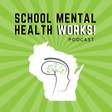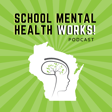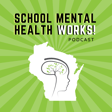
Episode 6: Storytime - A Tale of Two Caring Professionals and One Elementary School
What happens when a school partners with a mental health therapist for the first time? How does a therapist impact the world and work of the school social worker? What lessons will they learn along the way?
In this sixth episode, we dive deep into the story of two professionals responsible for supporting the mental health needs of students and families. The scene is Knapp Elementary School in the Racine Unified School District and our two key players are Kristine Jacobs, Child and Family Therapist with Children’s Wisconsin and Brenda Kunz, Knapp School Social Worker. Join Kristine and Brenda as they look back and unpack their first encounters with school-based mental health. Travel forward with them through the years as they explore the nuts and bolts of making collaboration a reality in their school/community partnership. This episode is a real page-turner – featuring plenty of happy endings (or really, new beginnings) for the teachers, students and families of Knapp Elementary!
Show Notes
Coalition for Expanding School-Based Mental Health in Wisconsin
Wisconsin Department of Public Instruction - Comprehensive School Mental Health
Wisconsin School Mental Health Framework
Children’s Wisconsin School-Based Mental Health
Racine Unified School District School-Based Mental Health
School Counselors and Social Workers


